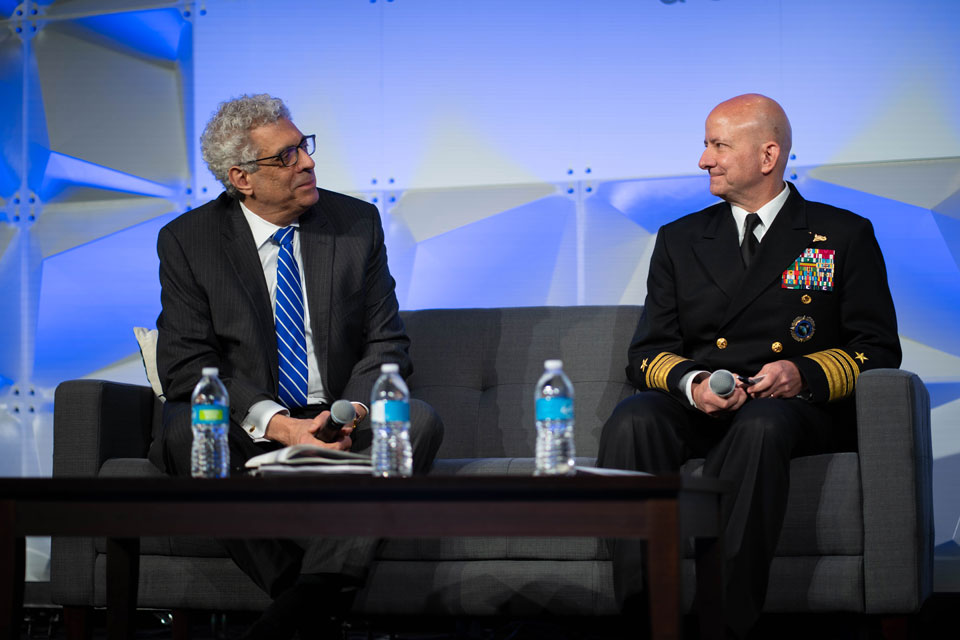Building the 21st Century Geospatial Ecosystem: SLU, NGA Host Annual Geo-Resolution Conference
Carrie Bebermeyer
Public Relations Director
carrie.bebermeyer@slu.edu
314-977-8015
Reserved for members of the media.
ST. LOUIS – On Sept. 14, the National Geospatial-Intelligence Agency (NGA) and Saint Louis University will co-host Geo-Resolution, an annual conference that encourages collaboration between government, academia and industry to grow the geospatial ecosystem in the greater St. Louis region. The free conference will be held in-person and also will be fully accessible to a remote audience.
This year’s conference will feature NGA Director Vice Adm. Robert Sharp; SLU President Fred. P. Pestello, Ph.D.; Harris-Stowe State University Interim President LaTonia Collins Smith, Ed.D.; Esri Founder and President Jack Dangermond; and Maxar Executive Vice President of Global Field Operations Tony Frazier.
Speakers and panelists will discuss the latest developments in the geospatial ecosystem, how geospatial science can solve some of the world’s most challenging problems, the importance of preparing the next generation of skilled workers and the ethical considerations surrounding an increasingly connected world.
Participants will have the opportunity to talk with geospatial experts from academic institutions, innovation hubs, start-up support companies and nonprofit organizations.
High-school and college students are encouraged to attend, as well. A special broadcast will feature young professionals discussing their careers in geospatial fields and will include questions from students in the audience. In addition, students who register will have the opportunity to join local leaders from industry, academia and government to explore geospatial career opportunities.
Students also are invited to participate in a poster session about the critical role of geospatial techniques in their research.
The conference is free and open to the public. Advance registration is required at: https://www.eventbrite.com/e/geo-resolution-2021-tickets-163083698733
For a schedule of events, panelists and speakers, visit: https://www.slu.edu/geoslu/georesolution/index.php
Geo-Resolution 2021 Conference Details:
When: 8 a.m. to 4 p.m. on Tuesday, Sept. 14.
Where: Saint Louis University’s Busch Student Center, 20 North Grand Boulevard, St. Louis, Mo., 63103.
Note: Conference safety protocols are contingent upon the City of St. Louis and CDC health guidelines. Masks will be required for all participants.
About NGA
NGA delivers world-class geospatial intelligence that provides a decisive advantage to policymakers, warfighters, intelligence professionals and first responders. NGA is a unique combination of intelligence agency and combat support agency. It is the world leader in timely, relevant, accurate and actionable geospatial intelligence.
NGA enables the U.S. intelligence community and the Department of Defense to fulfill the president’s national security priorities to protect the nation. For more information about NGA, visit us online at www.nga.mil, on Facebook or on Twitter.
About SLU
Founded in 1818, Saint Louis University is one of the nation’s oldest and most prestigious Catholic institutions. Rooted in Jesuit values and its pioneering history as the first university west of the Mississippi River, SLU offers more than 12,000 students a rigorous, transformative education of the whole person.
At the core of the University’s diverse community of scholars is SLU’s service-focused mission, which challenges and prepares students to make the world a better, more just place. Saint Louis University is one of nine Catholic universities with a higher or highest research activity designation from the Carnegie Foundation.
From the construction of a new Interdisciplinary Science and Engineering (ISE) Building to its remote sensing lab, and demonstrated by the extraordinary work of faculty and students in geospatial fields and beyond, academic life on SLU’s campus is vibrant, leading edge and full of potential.


















